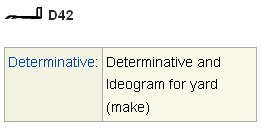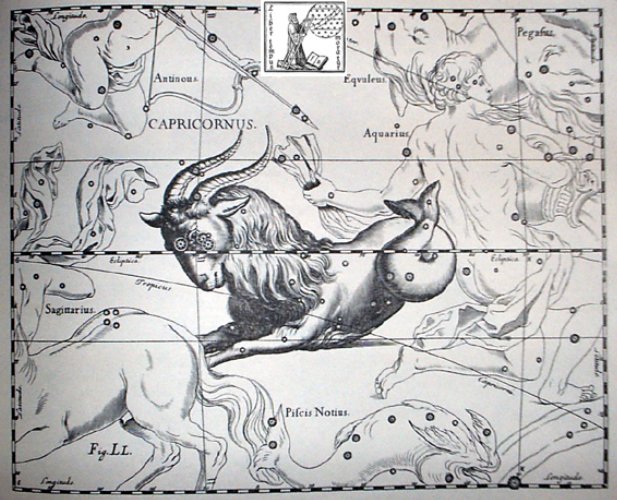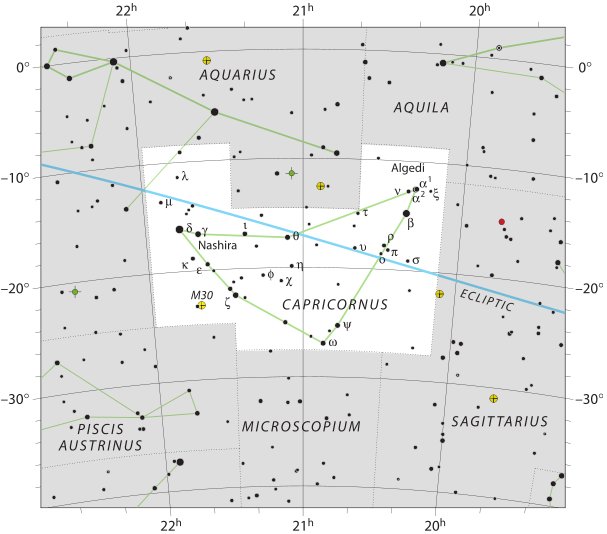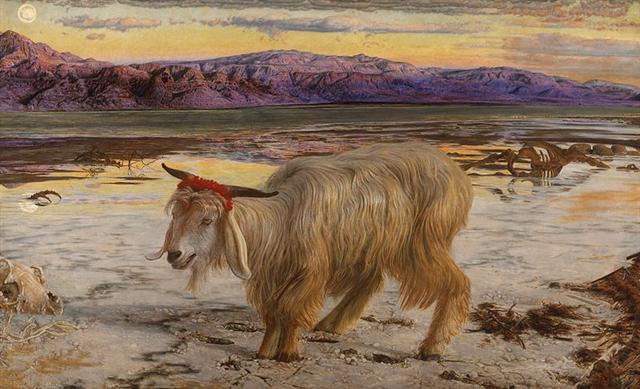Once again:
... In the morning of the world,
there was nothing but water. The
Loon was calling, and the old
man who at that time bore the
Raven's name, Nangkilstlas,
asked her why. 'The gods are
homeless', the Loon replied.
'I'll see to it', said the old
man, without moving from the
fire in his house on the floor
of the sea. Then as the old man
continued to lie by his fire,
the Raven flew over the sea. The
clouds broke. He flew upward,
drove his beak into the sky and
scrambled over the rim to the
upper world. There he discovered
a town, and in one of the houses
a woman had just given birth
...
Raven discovered a town which
reminds me of the 19th Arab
station with the odd name
City, a similar place for
assembling people:
|
19 |
Al Baldah |
City |
π Sagittarii (Al
Baldah) |
290.1 |
January 5 (370) |
|
20 |
Al Sa’d al
Dhabih |
Lucky One of the
Slaughterers |
α Capricorni
(Gredi),
β (Dabih) |
308.0 |
January 23 (388) |
|
21 |
Al Sa’d al
Bula' |
Good Fortune of the
Swallower |
ε Aquarii (Albali),
μ,
ν |
314.8 |
January 30 (394) |
|
22 |
Al Sa'd al
Su'ud |
Luckiest of the
Lucky |
β Aquarii
(Sadalsud),
ξ (Bunda), c (46)
Capricorni |
325.9 |
February 9 (405) |
|
23 |
Al Sa'd al
Ahbiyah |
Lucky Star of Hidden
Things |
α Aquarii
(Sadalmelik),
γ (Sadachbia),
ζ, η, π |
338.6 |
February 22 (418) |
... When it was evident that
the years lay ready to burst
into life, everyone took
hold of them, so that once
more would start forth -
once again - another (period
of) fifty-two years. Then
(the two cycles) might
proceed to reach one hundred
and four years. It was
called 'One Age' when twice
they had made the round,
when twice the times of
binding the years had come
together.
Behold what was done when the
years were bound - when was
reached the time when they were
to draw the new fire, when now
its count was accomplished.
First they put out fires
everywhere in the country round.
And the statues, hewn in either
wood or stone, kept in each
man's home and regarded as gods,
were all cast into the water.
Also (were) these (cast away) -
the pestles and the (three)
hearth stones (upon which the
cooking pots rested); and
everywhere there was much
sweeping - there was sweeping
very clear. Rubbish was thrown
out; none lay in any of the
houses ...
There were 5 weeks from the star Al
Baldah at the left
ear of the Archer to the star Sadalsud at the left shoulder of
Aquarius, and then there were a further 5
days to
θ Piscis
Austrini
-
but only a further 4 days if
the counting went to ι
Aquarii (which rose at the same time as
46 Capricorni):
 |
 |
 |
 |
 |
31 |
|
Ga8-22 |
Ga8-23 |
Ga8-24 (227) |
Ga8-25 |
Ga8-26 |
|
*225 (November 1) |
*226 = 290 - 64 |
*227 |
*228 |
*229 |
|
19h (289.2) |
Al Baldah-19 |
Aladfar (291.1), Nodus
II (291.5), ψ Sagittarii
(291.6), θ Lyrae (291.8) |
ω Aquilae (292.1), ρ
Sagittarii (292.6), υ
Sagittarii (292.7) |
Arkab Prior (293.0),
Arkab Posterior, Alrami
(293.2), χ Sagittarii
(293.6) |
|
λ Aquilae (Ant.)
(289.1), γ Cor. Austr
(289.3), τ Sagittarii
(289.4), ι Lyrae
(289.5), δ Cor. Austr.
(289.8) |
AL BALDAH,
Alphekka Meridiana
(290.1), β Cor. Austr.
(290.2) |
|
January 4 |
5 |
6 |
7 |
8 |
|
Tua Haro 4 |
5 |
6 |
7 (372) |
8 |
|
ºDecember 31 |
ºJanuary 1 (366) |
2 |
3 |
4 |
|
'December 8 |
9 |
10 |
11 (*265) |
12 |
|
"November 24 |
25 (*249) |
26 |
27 (331) |
28 |
|
7h (106.5) |
Wezen (107.1), τ Gemini
(107.7), δ Monocerotis
(107.9) |
no star listed (108) |
λ Gemini (109.4),
WASAT (109.8) |
no star listed (110) |
|
no star listed (106) |
|
July 5 |
6 |
7 |
8 |
9 |
|
He Anakena 5 |
6 |
7 (188) |
8 |
9 |
|
ºJuly 1 |
2 |
3 |
4 (185) |
5 |
|
'June 8 |
9 (160) |
10 |
11 (*82) |
12 |
|
"May 25 (*65) |
26 |
27 |
28 (148) |
29 |
|
*325 |
east |
west |
west |
east |
 |
|
summer
solstice |
winter
solstice |
 |
 |
 |
 |
 |
 |
|
Gb2-6
(261) |
Gb2-7 |
Gb2-8 |
Gb2-9 |
Gb2-10 |
Gb2-11 |
|
*261 =
325 - 64 |
*262
(342) |
*263 |
*264 |
*265 |
*266
(Dec 12) |
|
Al
Sa'd al
Su'ud-22
/
Emptiness-11
BUNDA
(Foundation)
/ KAKKAB
NAMMAΧ
(Star of
Mighty
Destiny) |
θ Piscis
Austrini
(330.1) |
|
Tsin
(325.2),
Alphirk
(325.7),
SADALSUD,
ξ Gruis
(325.9) |
no star
listed
(326) |
Castra
(327.2),
BUNDA
(327.5)
Sirius |
Nashira
(328.0),
Azelfafage,
κ
Capricorni
(328.7) |
Enif,
Erakis
(329.2),
46
Capricorni,
Jih
(329.3),
ι Piscis
Austrini
(329.4),
λ
Capricorni
(329.6),
ν Cephei
(329.7),
DENEB
ALGIEDI
(329.8) |
|
Febr 9
(40) |
10 |
11 |
12 |
13 |
14 |
 |
 |
 |
 |
 |
 |
|
Gb2-12 |
Gb2-13 |
Gb2-14 |
Gb2-15 |
Gb2-16 |
Gb2-17 |
|
LUCIA |
*268 |
*269 |
*270
(Dec
16) |
*271
(351) |
*272 |
|
Kuh
(331.4),
γ
Gruis
(331.5) |
no
star
listed
(332) |
η
Piscis
Austrini
(333.4) |
22h
(334.8) |
ι
Pegasi
(335.0),
Alnair
(335.1),
μ
Piscis
Austrini,
υ
Piscis
Austrini
(335.3),
Woo
(335.7),
Baham,
τ
Piscis
Austrini
(335.8) |
ζ
Cephei
(336.2),
λ
Cephei
(336.3),
-/270
Lac.
(336.7),
λ
Piscis
Austrini
(336.8) |
|
Kae
Uh
(334.0),
Al
Kurhah
(334.4),
SADALMELIK,
Al
Dhanab
(334.6),
ι
Aquarii,
ν
Pegasi
(334.7) |
|
Febr
15
(46) |
16 |
17
(14
*
29½) |
18 |
19 |
20
(*336) |
|
Egyptian arm |
 |
Phoenician
yodh |
 |
Greek iota |
Ι (ι) |
|
Yodh is thought
to have originated
with a pictograph of
a hand, ultimately
deriving from
Proto-Semitic
*yad-. It may be
related to the
Egyptian
hieroglyphic of an
arm. (Wikipedia)
 |
10 * 29 = 290
days at heliacal Al Baldah
in January 5 suggests this
was the final station for
the Old Sun, i.e. the end of a cycle
possibly measuring twice 5
months with 29 days in each.
|
Al Baldah |
34 |
Sadalsud |
4 |
θ Piscis
Austrini
|
|
January 5 |
February 9
|
February
14 |
|
*290 |
*325 |
*330 |
|
November 2 |
December 7 |
December 12 |
|
*226 |
*261 |
*266 |

Between
the City (Al Baldah)
and the Luckiest of
the Lucky (Sadalsud)
were the Lucky One
of the Slaughterers
(Dabih,
β Capricorni) and
the Good Fortune of
the Swallower
(Albali, ε Aquarii):
 |
 |
 |
 |
 |
|
Gb1-14 |
Gb1-15 |
Gb1-16 |
Gb1-17 |
Gb1-18
(247) |
|
*243
=
307
- 64 |
*244 |
*245 |
*246
(November
22) |
*247 |
|
Gredi
(307.2),
σ
Capricorni
(307.5),
Alshat
(307.9) |
Al
Sa’d
al
Dhabih-20
/
Ox
Herd
Boy-9 |
Okul
(309.6),
Bos
(309.9)
Arneb |
ο
Capricorni
(310.2),
θ
Cephei
(310.5)
Alnilam |
Rotten
Melon,
φ
Pavonis
(311.2),
η
Delphini
(311.4),
ζ
Delphini,
ρ
Pavonis
(311.7)
Phakt |
|
DABIH
(308.0),
κ
Sagittarii
(308.1),
Sadir
(308.4),
Peacock
(308.7) |
 |
 |
 |
 |
|
Gb1-19 |
Gb1-20 |
Gb1-21 (250) |
Gb1-22 |
|
*248
=
312
- 64 |
*349
(November
25) |
*250 |
*251 |
|
Rotanev,
ι
Delphini
(312.3),
τ
Capricorni
(312.6),
κ
Delphini
(312.7),
SVALOCIN,
υ
Capricorni,
υ
Pavonis
(312.8) |
Deneb Cygni (313.5), β Pavonis (313.6),
δ Delphini
(313.8) |
Al Sa’d al Bula'-21 /
Dhanishta-24 /
Girl-10 |
Baten Algiedi (315.8) |
|
Yue (314.3), Gienah Cygni, η Cephei
(314.5),
γ Delphini
(314.6), σ Pavonis (314.7),
ALBALI
(314.8)
Betelgeuze
|
Obviously
Albali, the
Good Luck of
the
Swallower,
had a
central role
to play. The
star was
rising with
the Sun in
RA day 314
and at
midnight
Betelgeuze
culminated.
A hanged
victim
followed.
 |
17 |
 |
5 |
 |
10 |
 |
4 |
 |
|
Al Baldah |
Dabih |
Albali |
Sadalsud |
θ Piscis
Austrini
|
|
January 5 |
January 23 |
January
29 |
February 9
|
February
14 |
|
*290 |
*308 |
*314 |
*325 |
*330 |
|
November 2 |
November 20 |
November 26 |
December 7 |
December 12 |
|
*226 |
*244 |
*250 |
*261 |
*266 |
|
"November
25 (*249) |
LUCIA (*267) |
"December 19
(*273) |
"December 30
(*284) |
"January 4
(*289) |
|
41 |
... Whereas, over the next two
days, Lono plays the part
of the sacrifice. The
Makahiki effigy is
dismantled and hidden away in a
rite watched over by the king's
'living god', Kahoali'i
or 'The-Companion-of-the-King',
the one who is also known as
'Death-is-Near' (Koke-na-make).
Close kinsman of the king as his
ceremonial double, Kahoali'i
swallows the eye of the victim
in ceremonies of human sacrifice
...
"Hitotsume-kozō
... are a yōkai of Japan that take on the
appearance of a bald child with one eye in the
center of its forehead." (Wikipedia)

At the time of
Bharani this was 273 days after 0h (i.e.
80 days after September 30) and also the other
dates at that time seem to have been in their
proper time order.

In Gb1-21
there could
be a pair of
hanging
eyes. One of
the pair of
Goat horns
(which south
of the
equator
would look
as if
hanging
down) seems
to be within
reach
according to
Hevelius.
He has Gredi
(α) at the
upper horn
and β
(Dabih) at
the lower
horn:


...
the names [Dabih and other similar ones]
undoubtedly come from Al Sa'd al Dhābi,
the Lucky One of the Slaughterers, the title of
the 20th manzil (of which these alphas
and β
were the determinant point),
manifestly referring to the sacrifice celebrated
by the heathen Arabs at the heliacal rising of
Capricorn ...

|















